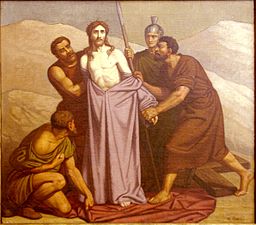 To counsel the doubtful is a Spiritual Work of Mercy, exemplified in the work of Jesus, who when confronted with the lack of belief on the part of Doubting Thomas said to him: “Put your finger here and see my hands, and bring your hand and put it into my side, and do not be unbelieving but believe“ (Jn 20:27). We are told that if one has the faith the size of a mustard seed, a remarkably little thing, one can move mountains. And yet, so many mountains remain. Often we find ourselves to be like the man looking to the power of Jesus saying: “I believe; help my unbelief” (Mk 9:24).
To counsel the doubtful is a Spiritual Work of Mercy, exemplified in the work of Jesus, who when confronted with the lack of belief on the part of Doubting Thomas said to him: “Put your finger here and see my hands, and bring your hand and put it into my side, and do not be unbelieving but believe“ (Jn 20:27). We are told that if one has the faith the size of a mustard seed, a remarkably little thing, one can move mountains. And yet, so many mountains remain. Often we find ourselves to be like the man looking to the power of Jesus saying: “I believe; help my unbelief” (Mk 9:24).
To counsel someone who struggles with doubt requires the counsellor to have faith to give. How can one witness what one does not see through the eyes of faith?
A classic account of a man of faith consoling a doubtful person comes from Fyodor Dostoevsky’s The Brothers Karamazov, in the chapter titled “A Lady of Little Faith”. In it, Fr. Zosima counsels a wealthy landowner, Madame Khokhlakov, who is stricken with religious doubt, finding it difficult to believe in the immortality of the soul and struggling against her imperfect charity, frustrated with herself for always looking for admiration and praise as a payoff. His advice to her, in her disgust at her imperfect love and her doubts, is profound. He says:
I am sorry I can say nothing more consoling to you, for love in action is a harsh and dreadful thing compared with love in dreams. Love in dreams is greedy for immediate action, rapidly performed and in the sight of all. Men will even give their lives if only the ordeal does not last long but is soon over, with all looking on and applauding as though on the stage. But active love is labor and fortitude, and for some people too, perhaps, a complete science. But I predict that just when you see with horror that in spite of all your efforts you are getting farther from your goal instead of nearer to it — at that very moment I predict that you will reach it and behold clearly the miraculous power of the Lord who has been all the time loving and mysteriously guiding you.
The deepening of our faith, our witnessing to it, and the highest consolation for the doubtful (not excluding our own selves), calls for active love.










